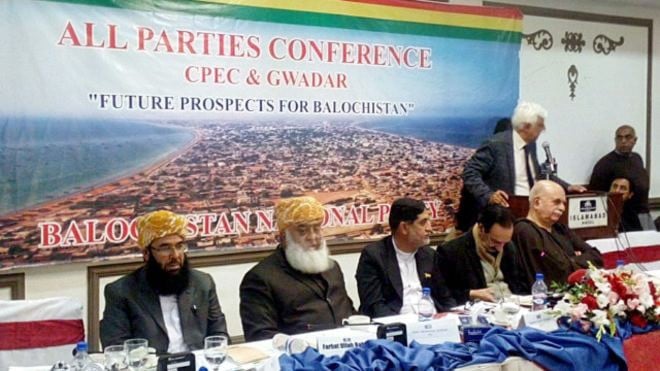
The grievances of the smaller provinces and how they are being redressed

Political forces in all three smaller provinces of Pakistan have objected to the China-Pakistan Economic Corridor (CPEC) on many counts, including a change in route. This has force the Prime Minister Nawaz Sharif to step in to take some damage control measures which began with an All Parties Conference.
Parties ruling the smaller provinces accuse the ruling PML-N of lack of transparency and hiding facts. They are of the view that the western route, passing through the underdeveloped areas of Zhob, Quetta, Dera Ismail Khan and other parts of Khyber Pakhtunkhwa and Balochistan provinces, was one which was mentioned in the project’s original plan.
The federal government is said to have made changes in the route, diverting it to the east of the country, mostly benefit Punjab.
The political parties in Balochistan and Khyber Pakhtunkhwa hold that the Corridor should create greater opportunities for backward and conflict-hit zones rather than making it more beneficial to the privileged Punjab province.
The Senate Committee on Communications demanded of the federal government to call a meeting of Council of Common Interests (CCI) and address the grievances of Balochistan and Khyber Pakhtunkhwa. The committee noted that these differences are gradually increasing and affecting the unity of the federation.
Senator Muhammad Daud Khan Achakzai, who heads the Senate’s Standing Committee on Communications, says the government is focusing more on constructing motorways on the eastern side and less on addressing reservations of smaller provinces. "Balochistan deserves a mega share of the benefits of this project because it has the Gwadar Port -- the primary reason of this huge Chinese investment."
Achakzai says not a single penny has been allocated for work on the western route in this financial year. "And no funds have been allocated for a feasibility study and acquisition of land for the establishment of industrial zones under CPEC, while the government has inaugurated construction work of several roads linked to CPEC in the Punjab provinces."
The National Party of Balochistan also believes the federal government is not taking the provinces and the party on board on the CPEC and other projects related to the economic corridor.
"Not a single brick has been laid on the Haripur-Dera Ismail Khan section, falling in the limits of KP," Pervez Khattak, the chief minister of KP, recently told the media. "The western route of the CPEC was 500-600 kilometres shorter than the eastern one. The area falling under western part was also backward and needed to be developed as the first priority," he said.
"The CPEC, primarily, is a Gwadar related project but now its focus has shifted to energy projects," says Dr Kaiser Bengali, senior economist, while commenting on the voices being raised by the smaller provinces.
"If there was no Gwadar, there was no CPEC. China generated interest in the CPEC because of this port and a memorandum of understanding was signed between the Chinese and Pakistani presidents in 2005. However, later governments changed its nature. And currently, the sitting PML-N regime has converted this CPEC investment of worth of 46 billion USD mostly into energy related projects," he says.
According to him, new projects have been added under the CPEC label that is also a major reservation of different political parties and provinces. "No doubt, energy is a big issue that needs to be addressed but not at the cost of original CPEC design. Basically, now the CPEC is not a Gwadar-Kashgar economic corridor. In this situation, the reservations of smaller provinces are very important."
Related article: China’s perspective
Bengali was called by a Senate Committee and it was told that there was not a single energy project planned at the moment in districts from where the CPEC is passing. He says Balochistan has no electricity transmission lines in the whole provinces; so how the people of that province can benefit even from this modified plan of CPEC?
He says the government gives contradictory answers to questions about CPEC. "The fears of the provinces must be expressed loudly in the parliament and related forums till the government makes it a consensus project," says Bengali.
The fact that the Orange Line Metro Bus project in Punjab is a part of the CPEC has further raised doubts of other provinces about the project. Reservations of smaller provinces have moved China to issue a statement regarding the CPEC, hoping the relevant parties in Pakistan strengthen communication and coordination to create favourable conditions for the project.
Dr Rasul Bakhsh Rais, senior political analyst, says CPEC is a historic opportunity that should be whole-heartedly welcomed in Pakistan. "The current politics and demands of provinces merely aim to get political mileage."
He thinks Pakistan has no big role in deciding whether the eastern route should be constructed or western and also that the pace of construction of the route changes according to the acquisition of land and available infrastructure on that route. "Punjab has better infrastructure, better pace of work, and quick acquisition of land," he concludes.